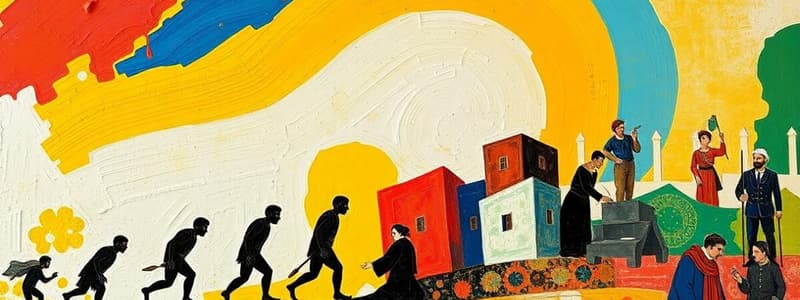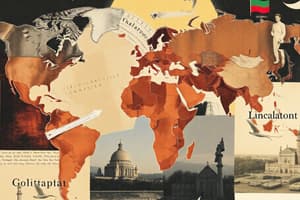Podcast
Questions and Answers
What is the primary focus of historiography?
What is the primary focus of historiography?
- The analysis of historical events
- The study of historical writing and methodology (correct)
- The cause and effect of historical changes
- The collection of primary and secondary sources
Which period is characterized by feudalism and the rise of Islam?
Which period is characterized by feudalism and the rise of Islam?
- Middle Ages (correct)
- Renaissance
- Classical History
- Early Modern Period
In which historical period did the Age of Exploration occur?
In which historical period did the Age of Exploration occur?
- Renaissance
- Modern History
- Early Modern Period (correct)
- Ancient History
What is a primary source?
What is a primary source?
Who is often referred to as the 'Father of History'?
Who is often referred to as the 'Father of History'?
What major event took place during Modern History?
What major event took place during Modern History?
What theme in history involves analyzing the consequences of events?
What theme in history involves analyzing the consequences of events?
Which civilization was NOT a part of Ancient History?
Which civilization was NOT a part of Ancient History?
Flashcards are hidden until you start studying
Study Notes
Overview of History
- Study of past events, societies, and individuals.
- Analyzes changes in culture, politics, economy, and technology over time.
Periods in History
-
Prehistory
- Time before written records.
- Studied through archaeology, anthropology.
-
Ancient History (circa 3000 BCE - 500 CE)
- Early civilizations (e.g., Mesopotamia, Egypt, Indus Valley, China).
- Development of writing, trade, and early governance.
-
Classical History (500 BCE - 500 CE)
- Rise of empires (e.g., Roman, Persian, Gupta).
- Significant philosophical, political, and cultural developments.
-
Middle Ages (500 - 1500 CE)
- Feudalism in Europe.
- The rise of Islam and the Byzantine Empire.
- The Crusades and cultural exchanges.
-
Renaissance (14th - 17th Century)
- Renewed interest in arts and sciences.
- Humanism and significant advances in literature, art, and science.
-
Early Modern Period (1500 - 1800)
- Age of Exploration, colonialism, and the beginning of global trade.
- Scientific Revolution and Enlightenment ideas.
-
Modern History (1800 - Present)
- Industrial Revolution and its impact on society.
- Major wars (e.g., World Wars I and II, Cold War).
- Social movements (e.g., civil rights, feminism).
Key Concepts in History
- Chronology: Study of the sequence of events over time.
- Primary vs. Secondary Sources:
- Primary sources: Original documents or artifacts (e.g., letters, treaties).
- Secondary sources: Interpretations of primary sources (e.g., textbooks, articles).
- Historiography: The study of historical writing and methodology.
Important Themes in History
- Change and Continuity: Understanding what changes over time and what remains constant.
- Cause and Effect: Analyzing why events happen and their consequences.
- Perspectives: Considering history from various viewpoints (e.g., social, economic, cultural).
Notable Historians
- Herodotus: Often called the "Father of History."
- Thucydides: Known for his work on the Peloponnesian War.
- Edward Gibbon: Author of "The Decline and Fall of the Roman Empire."
- Fernand Braudel: Promoted the idea of long-term historical structures.
Importance of Studying History
- Helps understand current societal structures and issues.
- Promotes critical thinking and analytical skills.
- Informs citizenship and comprehension of rights and responsibilities.
Overview of History
- Studying past events, societies, and individuals
- Examining changes in culture, politics, economy, and technology over time
Periods in History
- Prehistory: Time before written records, studied through archaeology and anthropology
- Ancient History (circa 3000 BCE - 500 CE): Emergence of early civilizations (Mesopotamia, Egypt, Indus Valley, China), development of writing, trade, and early governance
- Classical History (500 BCE - 500 CE): Rise of empires (Roman, Persian, Gupta), notable philosophical, political, and cultural developments
- Middle Ages (500 - 1500 CE): Establishment of feudalism in Europe, rise of Islam and the Byzantine Empire, the Crusades, and cultural exchanges
- Renaissance (14th - 17th Century): Renewed interest in arts and sciences, humanism, significant advances in literature, art, and science
- Early Modern Period (1500 - 1800): Age of Exploration, colonialism, and the beginning of global trade; Scientific Revolution and Enlightenment ideas
- Modern History (1800 - Present): Industrial Revolution and its societal impact; Major wars (World Wars I and II, Cold War); Social movements (civil rights, feminism)
Key Concepts in History
- Chronology: Study of the sequence of events over time
- Primary vs. Secondary Sources: Primary sources are original documents or artifacts (letters, treaties), while secondary sources are interpretations of primary sources (textbooks, articles)
- Historiography: The study of historical writing and methodology
Important Themes in History
- Change and Continuity: Understanding what changes over time and what remains constant
- Cause and Effect: Analyzing why events happen and their consequences
- Perspectives: Considering history from various viewpoints (social, economic, cultural)
Notable Historians
- Herodotus: The "Father of History"
- Thucydides: Known for his work on the Peloponnesian War
- Edward Gibbon: Author of "The Decline and Fall of the Roman Empire"
- Fernand Braudel: Advocated for the idea of long-term historical structures
Importance of Studying History
- Understanding current societal structures and issues
- Fostering critical thinking and analytical skills
- Informing citizenship and comprehension of rights and responsibilities
Studying That Suits You
Use AI to generate personalized quizzes and flashcards to suit your learning preferences.




